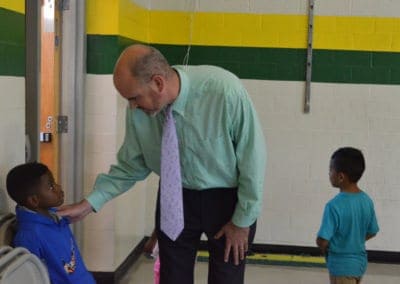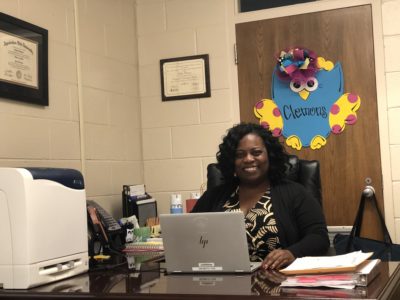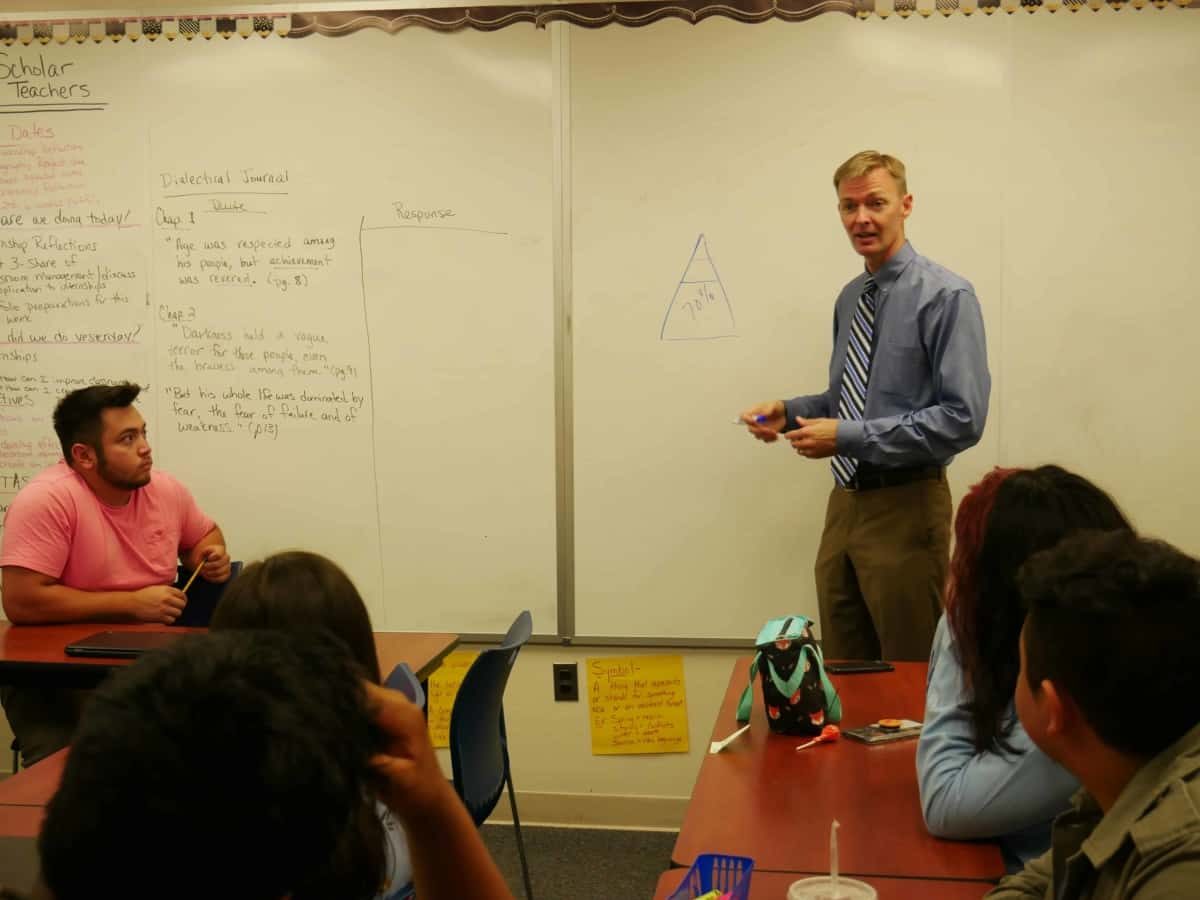
When the Transforming Principal Preparation Program (TP3) was created by legislation in 2015, its mandate was simple: transform the way principals in North Carolina are trained by providing competitive grants to innovative principal preparation programs. Of course, simple doesn’t mean easy, and for the past five years, the program has been turning out its first few classes of students.
At a recent State Board of Education meeting, Shirley Prince, director of the North Carolina Alliance for School Leadership Development (NCASLD), which was the initial administrator of the program, presented on how well the program is doing five years out. Prince is also the executive director of the NC Principals and Assistant Principals Association.
“We were supposed to have the programs get off on the right foot; make sure that they were following … what we call the non-negotiable practices, oversee the use of their funding, evaluate them, and then see what happened after that,” she said in an interview. “So now, we’re making our recommendations.”
So first, after five years, how are things going?
The past
To start with, TP3 was a collection of five university programs, though it has since grown. Those five initial programs were at High Point University, North Carolina State University, the Sandhills Regional Education Consortium, the University of North Carolina at Greensboro, and Western Carolina University.
Learn more about TP3…
The evaluation of the program during its first five years mainly looked at the first two funding cycles under the leadership of NCASLD. In the slide below, you can see the first two funding cycles encompass 2016-18 and 2018-20 and include all five of the institutions previously mentioned. NCASLD is also still overseeing some of the TP3 programs in the current funding cycle — cycle three — which runs from 2020-22. Soon, NCASLD will no longer be overseeing the program, something this article will explore later, but for now, let’s stick with the evaluation.
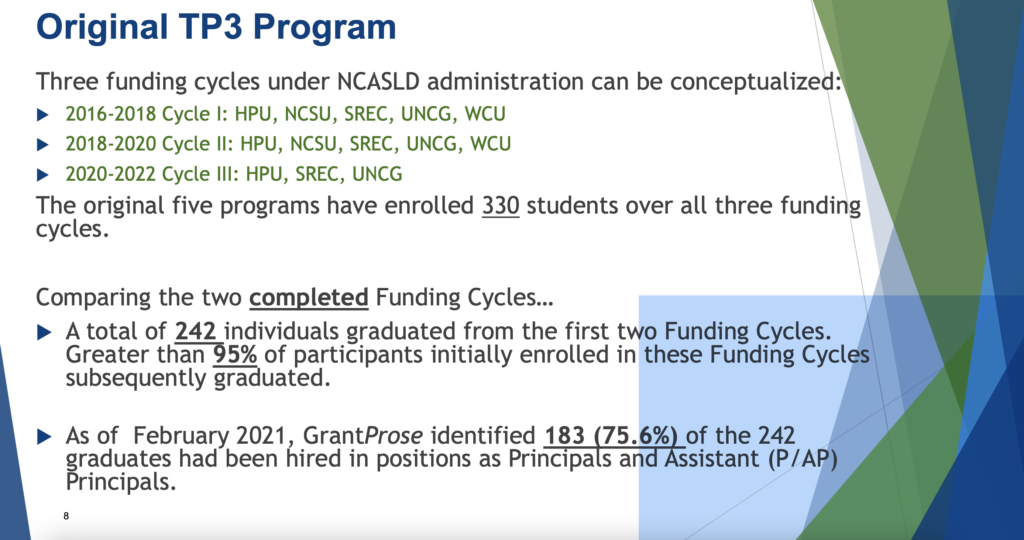
Over all three funding cycles, 330 students have enrolled. In the first two funding cycles, 242 graduated and 183 have been hired as principals or assistant principals. Though it wasn’t specified in this presentation, most of the graduates who were hired became assistant principals, though Prince said in an email that some have since gone on to become principals. Below is a breakdown by individual program.
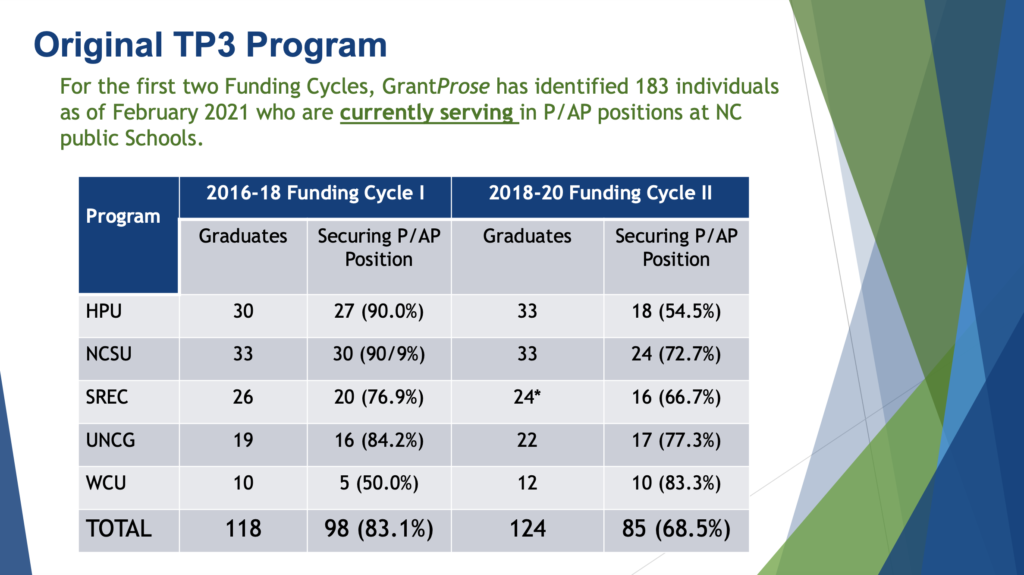
Of those graduates who have been placed, 161 serve at high-needs schools. You can see a breakdown of that data by individual program below.
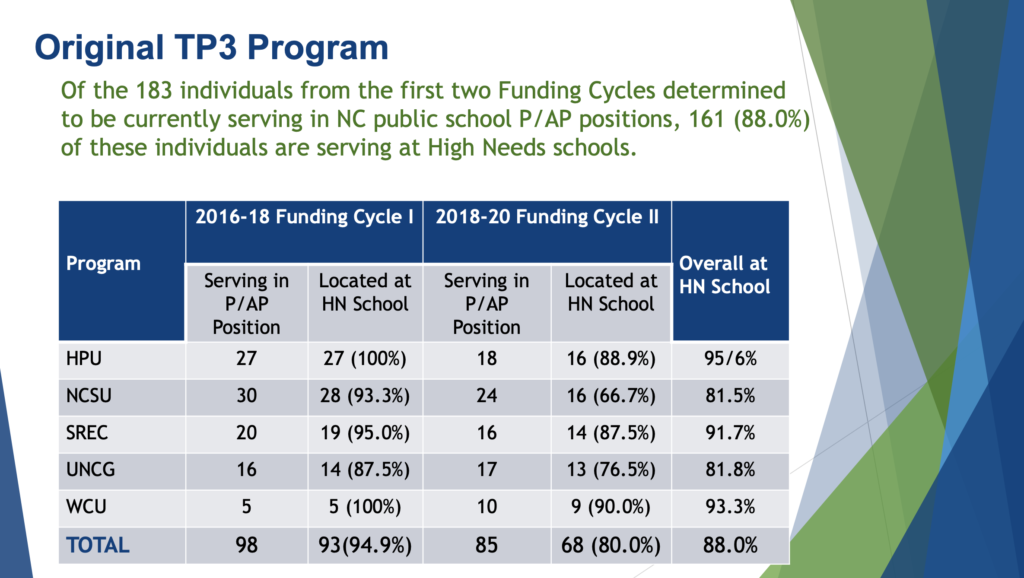
The evaluation also looked at what the programs had in common when it came to best practices and program practices.
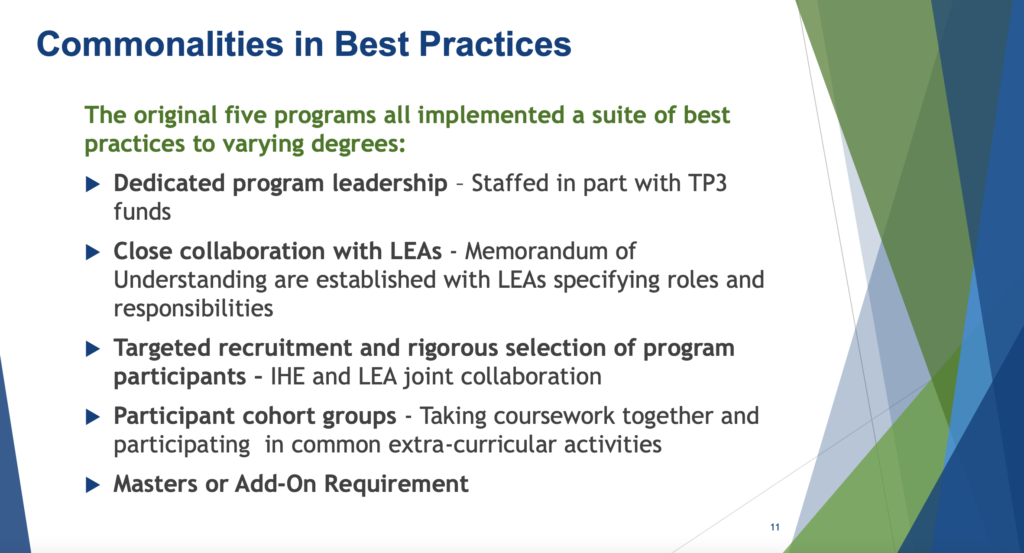
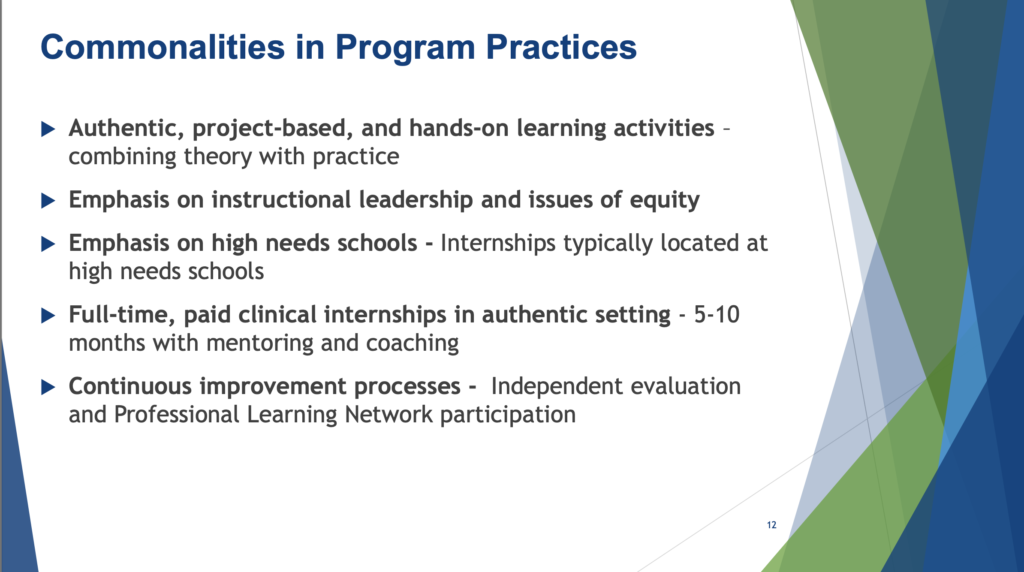
According to the evaluation, the total cost per graduate to the state for all programs from 2016-2020 was about $81,000, though that number varied significantly between programs.
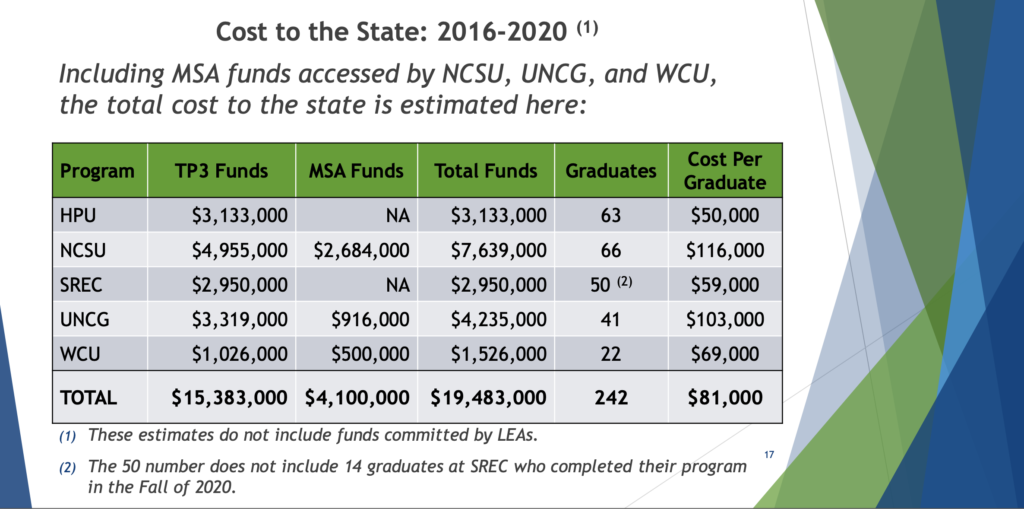
Prince also made a number of recommendations for scaling the program, which you can see below.
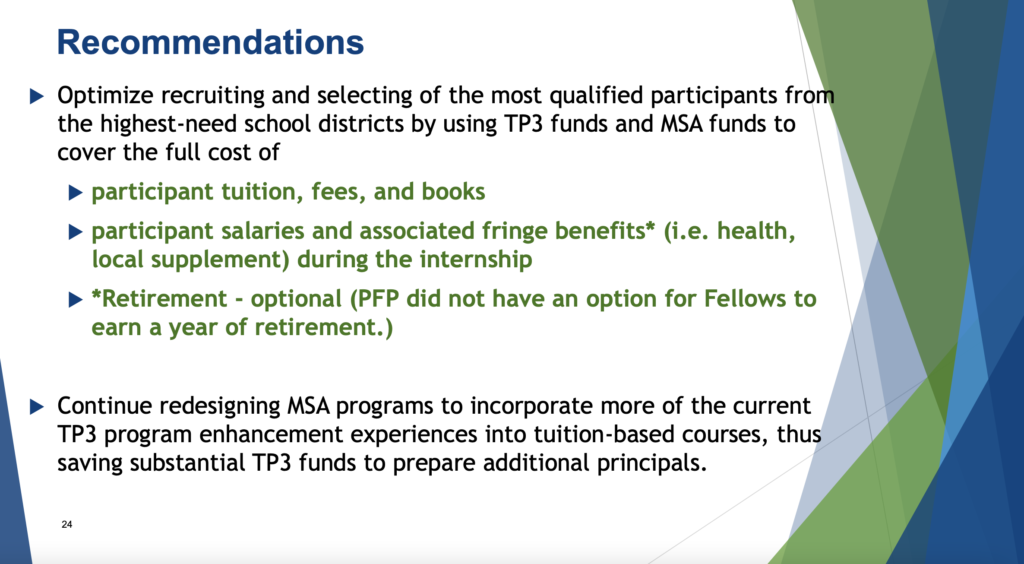
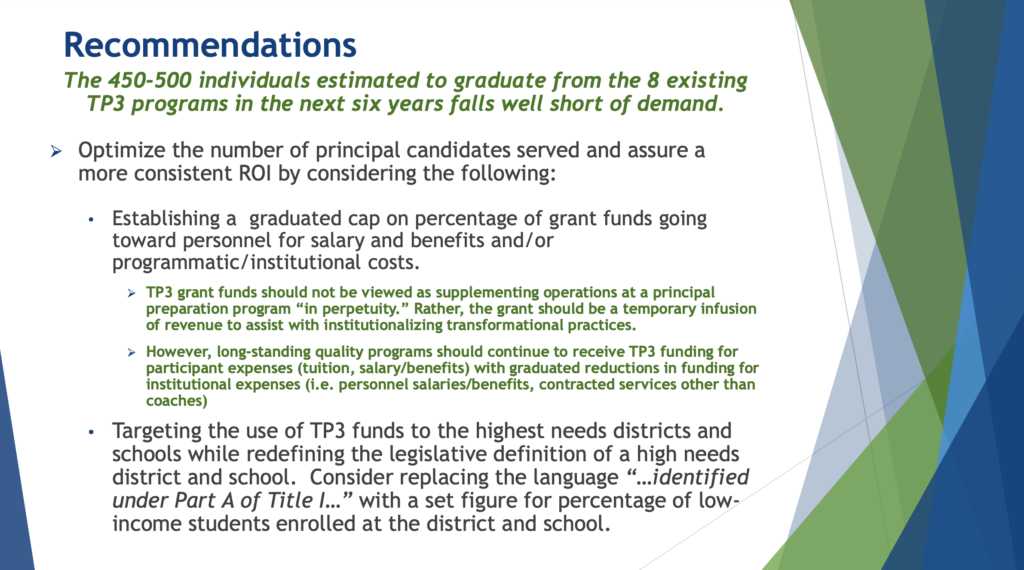
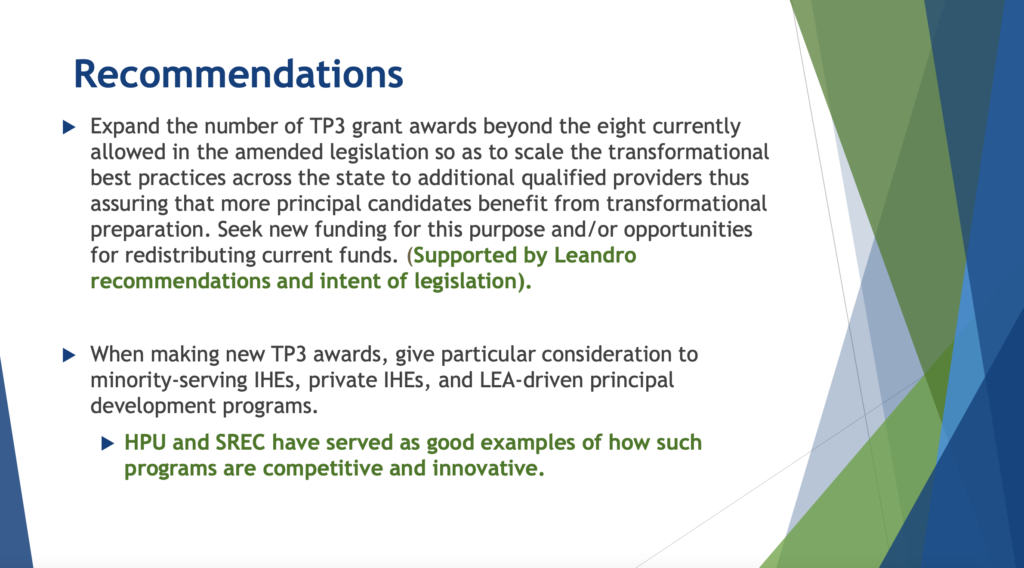
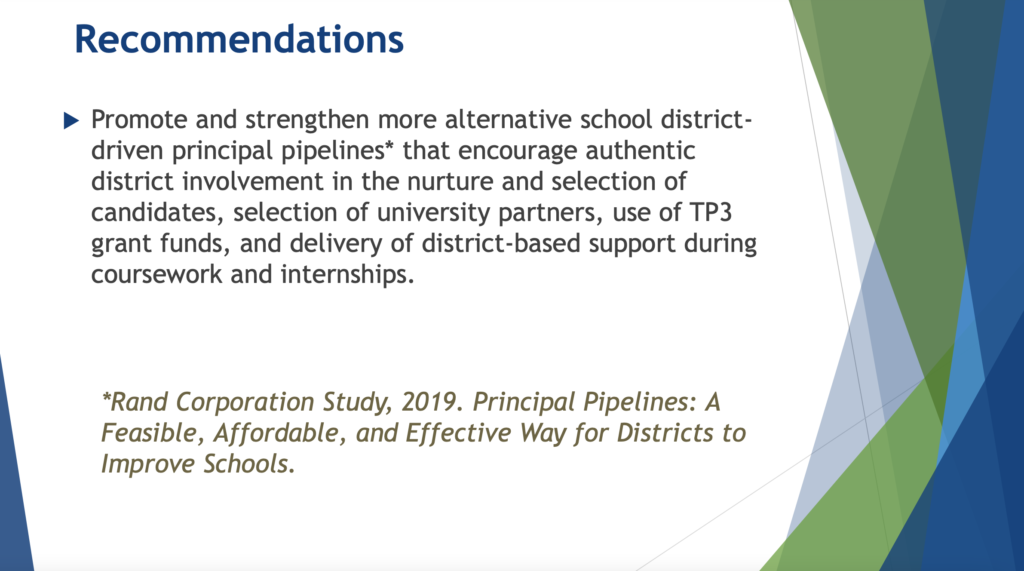
Prince and her organization were never necessarily supposed to oversee the program forever. In 2019, legislation amended the program to merge it with the North Carolina Principal Fellows Program. Come July 1, 2021, the merger will be complete, and the program will fall under the purview of Eddie Price, Director of the North Carolina Principal Fellows/Transforming Principal Preparation Program. The merger has already started, and there are a total of eight institutions that are now and will continue to be a part of the merged program. Prince will continue involvement in TP3 as a member of the commission that oversees the merged organization.
The merged organization includes the original five TP3 programs, as well as programs at East Carolina University, North Carolina Central University, and the University of North Carolina at Charlotte.
One point Prince made during her interview is that she thinks, ultimately, that all principals in the state should be trained through a TP3 program.
“We believe that the intent of the legislation was to transform principal preparation across the state,” she said, adding later: “If we have enough funding … then why would we even approve a principal preparation program that doesn’t do these things that have been shown to develop better principals?”
The future
The North Carolina Principal Fellows Program is a program that provides scholarships to applicants who want to become principals. Prior to the merger with TP3, the principal fellows program was fairly simple, according to Price.
Students could go to a number of public universities in North Carolina. The principal fellows program would choose them, give them money, and then the students took it from there. The problem was that Price wasn’t sure this was the best way to develop the state’s future principals.
“To be honest with you, what I saw very quickly … was that the principal fellows program didn’t have a metric or accountability,” he said, adding later: “What I saw was a disparity in what they were getting in the programs.”
Price said that at some principal preparation programs, the students were treated like any other person pursuing a higher education. There were no extra resources, retreats, coaches, etc. And then other programs were going the extra mile with a dedicated staff member who acted as a mentor or coach, as well as other enhancements.
“I was concerned that there was no way to measure the quality of each program,” he said. “They were just the recipients of someone who got a scholarship.”
So when the idea of merging the principal fellows program with TP3 was floated, Price was intrigued. By combining the scholarship component of the principal fellows with the programs under TP3, there could be some level of oversight and quality control. And there could be some evaluation to determine how everything was working.
In theory, the evaluation of the first five years of TP3, presented to the State Board of Education, provides some of that information, but not enough according to Price. He said the evaluation provides a lot of good information on the front end: how many students participated, how many graduated, and how many got a job. But there isn’t a lot of information about outcomes yet. For example, will the graduates impact student equity, change school climate and culture, improve student achievement, and narrow the opportunity and achievement gap? These are questions Price is asking and questions that can’t be answered yet.
Price pointed out that it takes two years for a student to graduate from the program, and then the majority get jobs as assistant principals. They will have to do that for a few years before getting moved up to principal.
He said the initial evaluation and the results presented by Prince are a good first step.
“I think her data is great. That’s great stuff, but there is a second step to it. But it takes time,” he said.
The evaluation has to continue, he said. TP3 needs to continue to follow graduates and see how they’re doing. He said the state doesn’t just need good principals. It needs great principals.
Together, TP3 and principal fellows are producing about 40% of the state’s principals, Price said. And that’s good. But he and the commission that oversees his organization want to see that doubled.
Price said that the Transforming Principal Preparation Program was receiving about $4 million a year while principal fellows received about $3 million. So, combined, the consolidated program funding is about $7 million. For $5 million more, he said it’s possible for the merged program to train 80% of the state’s principals. He said that equates to about $10 to $15 per K-12 student in the state.
“People look at this and say this is a lot of money, but if you are saying you want to change the trajectory of K-12 education … what other approach is that inexpensive in education?” he asked.
As for the other 20% of principals, he thinks they should continue to come from principal preparation programs that aren’t under the umbrella of his organization. He said it’s fair to allow room for alternative programs or even out-of-state students.
Prince also presented to the State Board of Education this month. See his slide deck below.
What one principal has to say
You may know Matt Bristow-Smith as one of the advisors to the State Board of Education, a role he has because he was chosen as the state’s 2019 principal of the year. Or, you may know him as the principal of Edgecombe Early College High School in Edgecombe County. But something else you should know about him is how he became a principal.
He attended Northeast Leadership Academy, a principal preparation program at North Carolina State University. NELA, as it is called, is one of the individual programs under the umbrella of TP3, but its reputation precedes it.
It’s a program that targets historically low-performing schools, and it started in 2009 with funding from the Bill & Melinda Gates Foundation. You can listen to a podcast I did about it here.
“The NELA program made an explicit commitment to reinvesting in the same county I was teaching in, and that was important to me as a principal candidate,” Bristow-Smith said. “I wanted to know that my principal preparation program would prepare me to return back to the specific context where I had been teaching and where my heart was.”
In fact, NELA partnered with Edgecombe County to try to bolster the principal pipeline there, Bristow-Smith said. He said that made him feel like he was part of something bigger than him.
The program’s emphasis on place-based learning was valuable, too, he said. It prioritized helping Bristow-Smith and others understand the communities that their students were coming from, the school practices that could make children’s experiences more equitable, and how the school could give families more hope. He said there was a strong focus on showing schools as places where kids can find opportunities.
He also praises the program’s paid internship, where Bristow-Smith got to spend a year working with a veteran principal.
“I can’t emphasize enough the importance of that internship,” he said. “The internship made all of the coursework more relevant because I was able to see its application in practice on a daily basis, and it also created a safe place where I could stretch my leadership skills and develop my voice as a school leader, to clarify my values as a principal and to get my legs under me.”
Bristow-Smith got to hear the presentations from Prince and Price at the State Board of Education meeting this month. He said he was encouraged to see that TP3, both before and after the merger, was showing a commitment to innovative practices. But, he said innovation isn’t enough.
“Something is not just innovative because it’s new and different,” he said. “We don’t continue doing something just because it’s innovative. We continue doing something because it’s valuable and achieves outcomes.”
So, he said it’s important that evaluations of TP3’s effectiveness and outcomes continue. Bristow-Smith said the state must be able to pinpoint which innovation programs under the TP3 umbrella are creating the best outcomes, because those innovative programs are the ones that should be scaled.
But it will take time, and he said the funding for the program must continue so that leaders can figure out what is working and what’s not in the world of transforming principal preparation. And given his experience with NELA, he is optimistic.
“I have seen the impact that the NELA program made upon Edgecombe County Schools’ principal pipeline, so I’m incredibly optimistic about the impact that TP3 will make … as their graduates get their first principalships,” he said.
Editor’s note: Shirley Prince serves on EducationNC’s Board of Directors.



